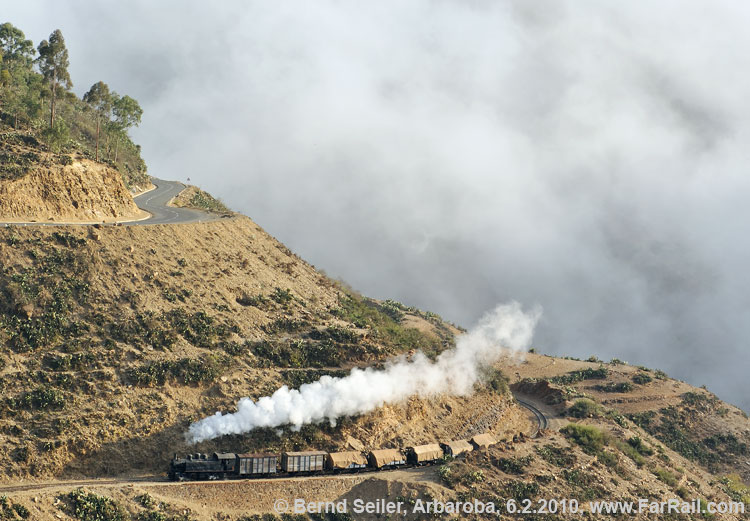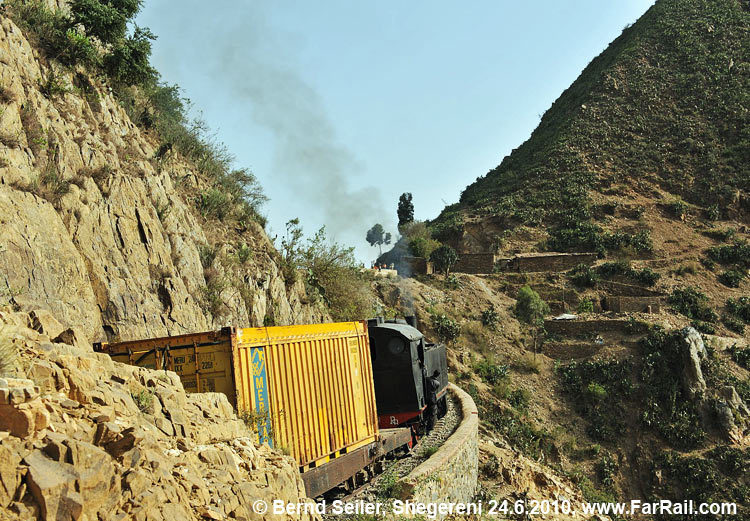

The highlights:
A UN adviser once decreed that the loading gauge in the tunnels along the line between Massawa and Asmara was too small for container trains. This myth survived for a long time, even after Eritrean Railways made a successful test run with a 40 ft container. Only one picture exists of this test – of a container leaving a tunnel. It was taken in cloud and so is not a good advertisement for generating container traffic on the railway.
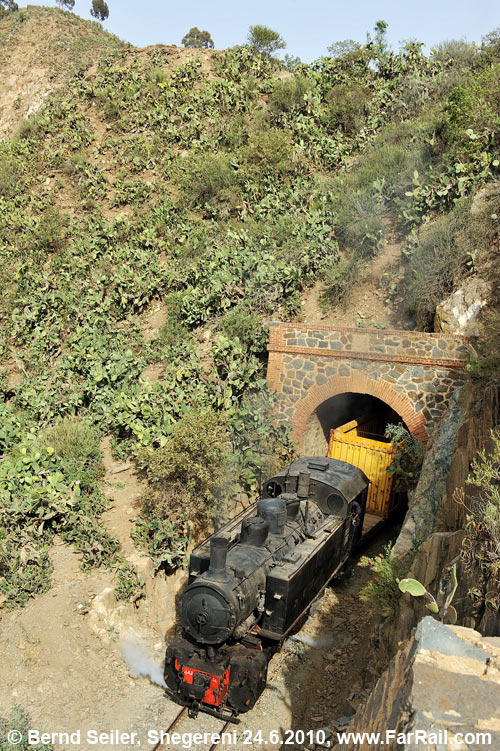
In June 2010 we went to Asmara to take some more shots of a container on a train. We loaded a 20 ft container on one of ER’s flat wagons of and went off down to Shegereni. There was more than sufficient room all round for the container in the tunnels.
On the FarRail Tours Eritrean tour last February we included a visit to the workshop in Asmara. A living museum! Almost no machine was younger than 70 years. With these machines and tools they keep their small fleet of aged steam locomotives in repair. Machines designed for repairing diesel locomotives couldn’t be found anywhere. This was either because the railway never purchased special machines for diesels or because more modern machinery was taken away during the country’s war of independence to repair military equipment. A participant in that tour, the Danish photographer and filmmaker René Strandbygaard Olsen, who has excellent connections with the DSB, the Danish state railway, and with the shipping company Maersk wanted to help. In September 2010 DSB will close one of their workshops and Maersk has a lot of unused shipping capacity on their ships due to the economic downturn. The two companies were persuaded to donate this equipment to the Eritrean Railways to upgrade their workshop and to transport it to the country free of charge. The (non-public) visit in June 2010 was undertaken to help prepare the ground for this.
During the trip we also called on some of the potential future customers of the railway. We visited a cement factory under construction in Massawa-Gadem and talked to the manager of the existing cement plant in the city. We also went to see the harbour authorities in Massawa and one of the mining companies near Asmara which will start production soon. The future of the railway seems to be bright; the planned transport volume more than equals the capacity of the existing line! The mining company wants to ship ore concentrate to Massawa harbour while the cement plant will cater for the domestic demand for cement and concrete products which will need to be shipped to Asmara, Keren, Argordat and beyond. Both companies plan to move around 300,000 tonnes per year over the railway. The mine will guarantee this transport volume for ten years while the cement plant will produce 1,000 tons per day for more than 20 years which would allow for the amortisation of the infrastructure costs. The harbour authorities have for a long time wanted to move containers over the railway but because the railway has no modern locomotive regular freight transport has never been started.
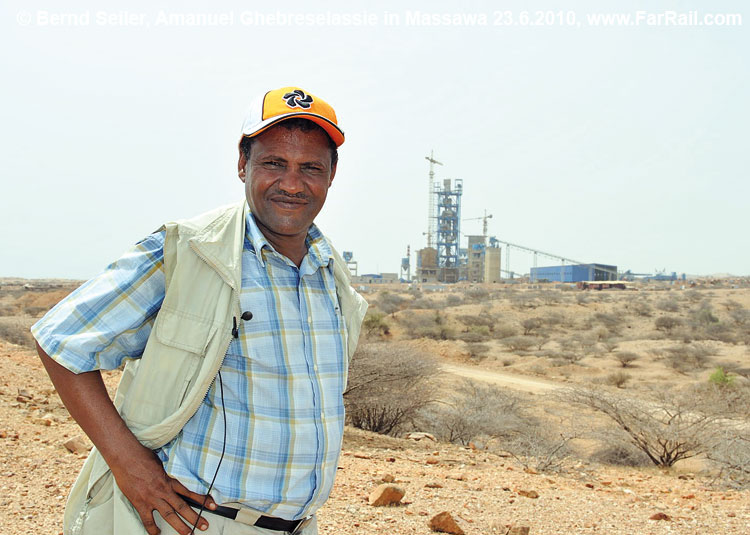
There are probably many railway managers who would light a fire of joy if their business had such good prospects. The main road is steeply graded and there are lots of hairpin bends. It would never provide much competition for a modernised railway. The only thing that needs to be done is to get the freight service rolling.
But new locomotives and freight wagons are expensive as would be the installation of a modern signalling system. It would all have to be sourced overseas. The Eritrean Railways hoped for (and almost received) funding from Italy. But in the end the money promised was earmarked for an agricultural project rather than the railway. There are many projects competing for foreign aid such as a proposed ring road around Asmara, a apartment block project which ground to a halt midway through, a dam and, of course, the railway. The hard work of rebuilding the line from Massawa to Asmara was done entirely using local resources after international consultants declared it to be impossible. However further development would need a great deal of foreign exchange which just isn’t available. So we’ll start to help directly by assisting the donation of the machinery and tools from the DSB to help the railway workshop to become more efficient and to acquire the capability to maintain and overhaul diesel locomotives.



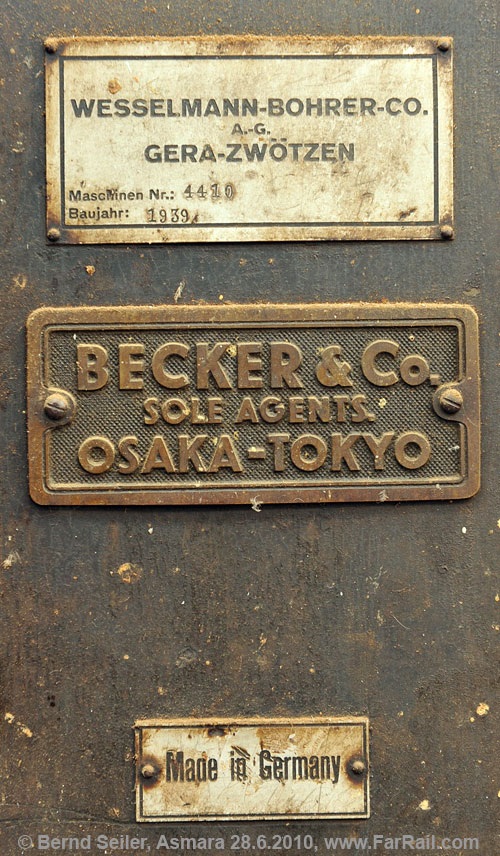
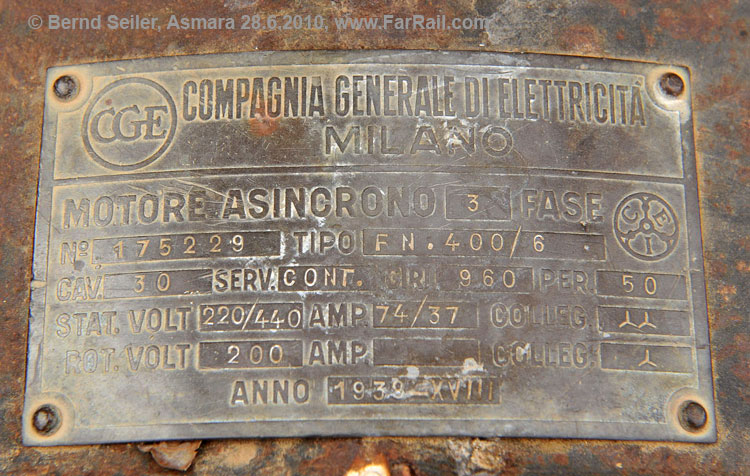

These machines and tools will be delivered in two containers. They’ll be shipped from Denmark via Jeddah in Saudi Arabia and off-loaded at pier 2 at Massawa docks – straight onto a steam train waiting alongside the ship. In the late afternoon the container train, with its 442 class 0-4-4-0T Mallet loco, will set off from Massawa and will run to Moncullo where we hope to run across the long viaduct there at sunset. The train will then continue in the dusk and the early evening dark to Mai Atal where it will stop for the night. The next day we’ll run as far as Ghinda and the day after that we’ll be double headed by two of the 442’s through the spectacular hilly country to Arbaroba. On the day after that the double-headed train continues to Asmara and the precious load will be steam-hauled up to the workshop for customs examination. Finally there’ll be a charter train with the smaller Mallet class 440 for our group with many photo runpasts.
On this special event priority has to be given to the delivery of the precious machinery donated by the DSB and shipped by Maersk. In addition a filming project to make a documentary about this donation is an essential part of the operation. That’s why only ten other photographer or videographer customers will be allowed to take part in this very special event. For sure this exclusive club will get outstanding results but we need to mention that we must fit in with the needs of the professional film crew, led by the Danish top-ten film producer Dan Sall. It’s quite possible that the tour members will be shown in the film and it won’t be possible to opt out of this. If you’re not happy about appearing in the film you may prefer to book instead on our regular tour to Eritrea in March 2011.
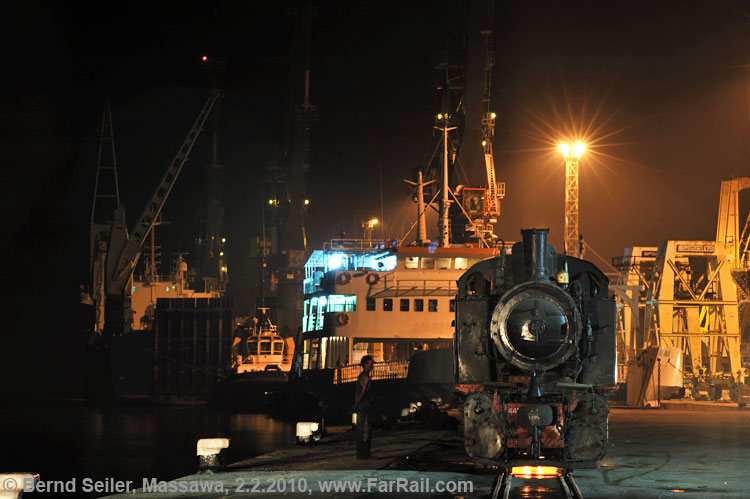
Dates are not fix yet!
| Date | Itinerary |
| 29.11. | Flight from Europe to Asmara |
| 20.11. | Check into our hotel in Asmara, visit to the workshop of Asmara in the late morning, in the afternoon we’ll go down by road to Massawa, hotel in Massawa. |
| 01.12. | Morning regular shunting in Massawa, later visit to the war-damaged old town of Massawa. Unloading the containers directly from the ship to the railway in the afternoon. Later on, our container train, together with one passenger coach, will go to Moncullo, sunset at the famous Moncullo bridge (featured on one of the country’s banknotes), in the evening we’ll return to our hotel in Massawa. The train will continue to Mai Atal during the evening or night. |
| 02.12. | Early morning charter bus from Massawa to Mai Atal, container train from Mai Atal to Ghinda, arriving at dusk. Charter bus from Ghinda to Asmara, hotel in Asmara. |
| 03.12. | Return from Asmara to Ghinda by charter bus in the early morning, continue double headed from Ghinda to Arbaroba (two class 442 locomotives), by charter bus from Arbaroba to Asmara, hotel in Asmara. |
| 04.12. | In the morning we return by road from Asmara to Arbaroba for the final section of the train journey, arriving in Asmara around noon. In the afternoon we’ll continue to the workshop in Asmara where the containers will be unloaded and will be opened by the customs. Hotel in Asmara. |
| 05.12. | In the morning guided sight-seeing tour in Asmara or you’ll go to the workshop to see them unloading the containers, In the afternoon we’ll run a charter freight train with the traditional two axle freight wagons hauled by the small Mallet 440 008 from Shegereni to Asmara before the night return flight to Europe. We’ve booked our hotel until the night. |
| 06.12. | Arrival in Europe in the morning. |
The line runs from Massawa harbour through hilly coastal land with a desert character up to Mai Atal (km 29). After Mai Atal several dry riverbeds are crossed by long stone arched viaducts before the ascent becomes noticeable. Before Ghinda (70 km, approx. 1,000m above sea level) there are the first tunnels. Then the really breathtaking part of the line starts, with many tunnels, bends, bridges and retaining walls. The summit is reached at 2,430m above sea level between Arbaroba and Asmara (km 118). After Asmara the route runs through slightly flatter country for the first 20 km before it continues along a river in mountainous countryside again, but this part hasn’t yet been rebuilt.
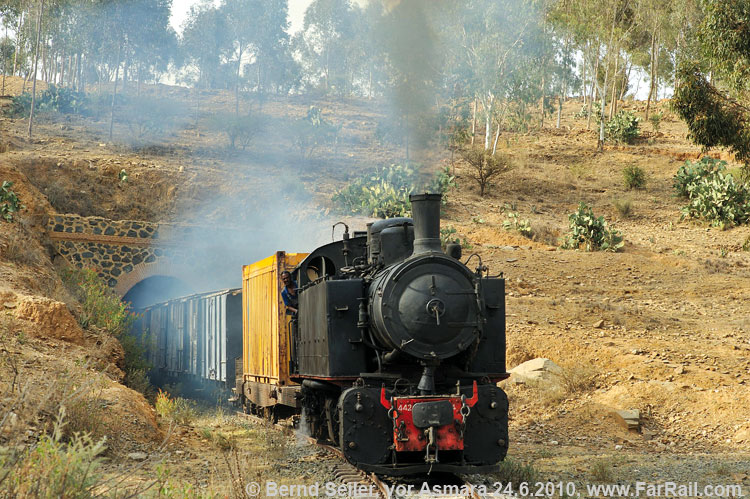

The railway, as already mentioned, was built through some difficult terrain. There are photo locations, which only have room for ten to 15 photographers. There will be no more than two film crews together with our train so it should be easy to find good photo or video locations for everyone. Sometimes we’ll make two run pasts to make sure everyone achieves success. Please bear in mind that nobody should get in other people’s way during the runpasts. Our time for photography is naturally limited by the shadows of the mountains in early morning and late evening and by the harsh light at midday. We won’t waste our energy trying to get shots in the midday sun. Please bear in mind that the film crews may take some more time at certain locations and have less interest elsewhere. The ideas of the film crews have priority here. You’ll get many good and spectacular shots, but we’ll not “work down” every milestone or every so called “must have” position. It may be necessary to change parts of the tour completely.
Please don’t get carried away with the scenery and remember that we are in the mountains. One wrong step can lead to a fall that can seriously endanger your health or even your life. If you take part in this tour you do so at your own risk, particularly when getting out of the train along the line and moving through the terrain. If you aren’t up to reaching a certain photo point, for example because the wine the night before was very nice, please stay in the train! There will be other photo spots that can be reached more easily and will be just as good.
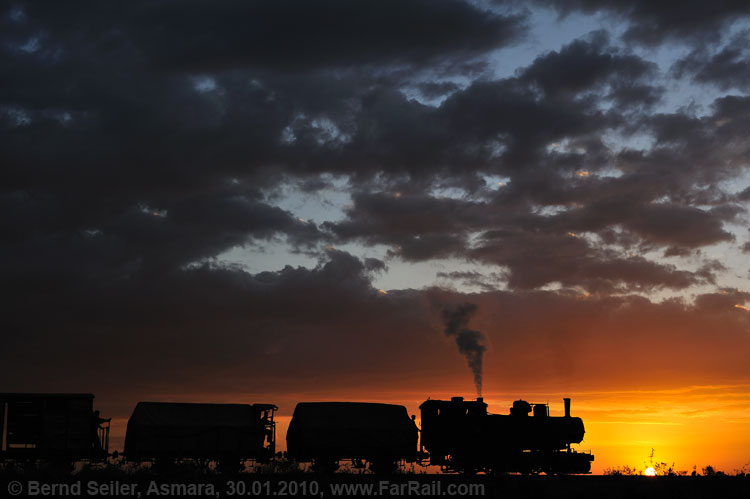
Booking this tour requires that you’ll understand the primary target of the tour: the donation of machinery and tools to the Asmara workshop and making a film about the project. The wishes of the film teams will have priority even if these take more time than we are used to. This tour can’t be recommended for self-centred individualists and people who fear that they might miss a certain photo position. For the “hardcore photographer” we recommend our regular tour to Eritrea in March 2011 instead. This December tour is a very special event where photography won’t be the be-all and end-all.
Eritrea is a country which only gained its independence in 1991. Before that an independence war raged for decades. Even after independence there was more fighting over the exact borders with Ethiopia. Currently there are some disputes about the border with Djibouti – but in Asmara and Massawa you’ll not notice these problems. The country has not fully recovered from these long periods of war and there is widespread poverty. Unlike many other African countries this hasn’t led to a high rate of crime. Eritrea is one of the safest countries in the whole of Africa. The locals are very friendly and helpful. Even though tourism is still in its infancy our hotels are of a good standard (matching 2 or 3 star hotels in western Europe) and are clean. This time we offer a hotel option. There is a good hotel in the city built in 1899 which was refurbished just recently. This hotel is more expensive but more comfortable. Please mention in the remark line of the booking form if you want to stay in the better hotel. It offers single rooms only.
This is the better hotel:
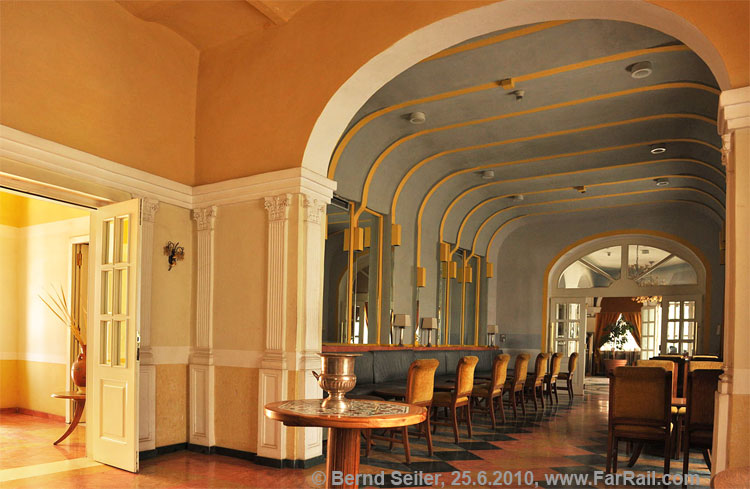
We expect temperatures of 25 degrees in Asmara and just above 30 degrees in Massawa where it barely cools down at night, unlike Asmara where the temperature can drop to 8 degrees in the early morning. Rain is fairly unlikely but the area near Ghinda often experiences fog which on some occasions allows for some really atmospheric shots but on others makes photography impossible for a couple of hours. Our hotel in Massawa has air conditioning.
Under 2,000 m altitude there is a risk of malaria for the entire year. The best way of preventing malaria is to avoid getting bitten by mosquitoes so it’s recommended you wear long clothing in the evening but you must take a suitable prophylactic as well. Long clothing is also a cultural necessity as half of the country’s population is Muslim (the other half is Christian). Short trousers are unsuitable for wearing in public even if it’s really hot.
The electricity supply (220 Volts) is reasonably dependable though sometimes you will need an adapter for your plugs. There is a mobile phone network in the country but no western phone company has signed a roaming contract so far. That’s why you can’t use the mobile network with a western phone. International calls are possible from our hotel in Asmara. You can also call abroad in the large towns via the telephone exchange. In Asmara and Massawa there is (a very slow) internet access.
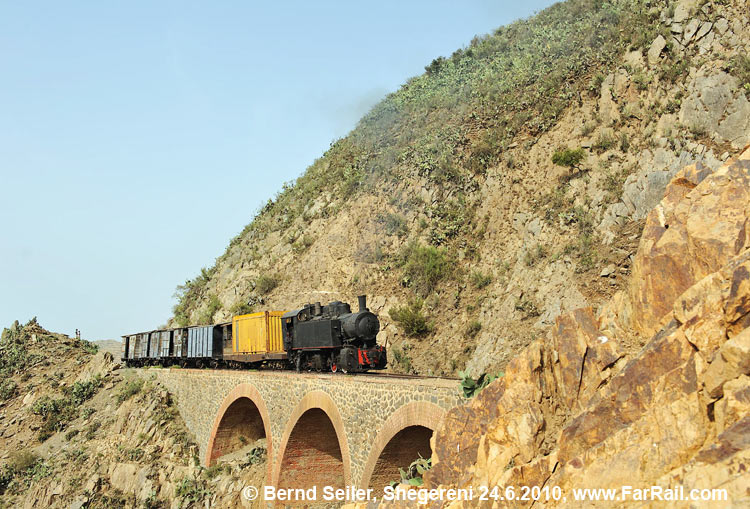
You should take all the usual precautions for a stay in the tropics if you want to have a trouble-free trip rather than a hospital stay. Basic rules like only eating peeled and/or cooked food and not drinking tap water should be strictly observed. Besides the local-style food, which you really must try at least once, many Italian influences remain from the colonial era. There’s no problem getting a really good pizza in Asmara. You can order and buy lunch packs from our kind female attendants. Cold drinks can also be bought on the train for very reasonable prices. Coffee on the train is included in the tour price. Beer is expensive in Eritrea - a small one costs about £1.50, while dinner generally costs from around £5 upwards.
The railwaymen have already entertained several groups of railway enthusiasts and know what we want and how we want it. Now they’ve even got used to the high demands of a FarRail Tours charter train event. Even so, we are in Africa where time has a different meaning from that in our hurried world. We have to account for problems on a railway with engines that are only used every few weeks. Serious delays are possible. And with a temperature of 32 degrees Celsius in the shade there’s no room for frantic rushing around when solving a problem. But there will always be a solution. Don’t lose your temper or spoil other people’s fun if, for example, an injector doesn’t behave itself. The quality of the railway’s coal can be dubious and we may need some extra breaks to raise steam pressure. Even with the worst possible timekeeping you’re guaranteed many very good pictures in a great mountain landscape. In the case of technical problems with the locos we may have to cancel trains with no refund possible. The itinerary may be changed without prior notice.
Later registrations will be accepted if hotels are still available and the maximum number of participants hasn’t been reached.
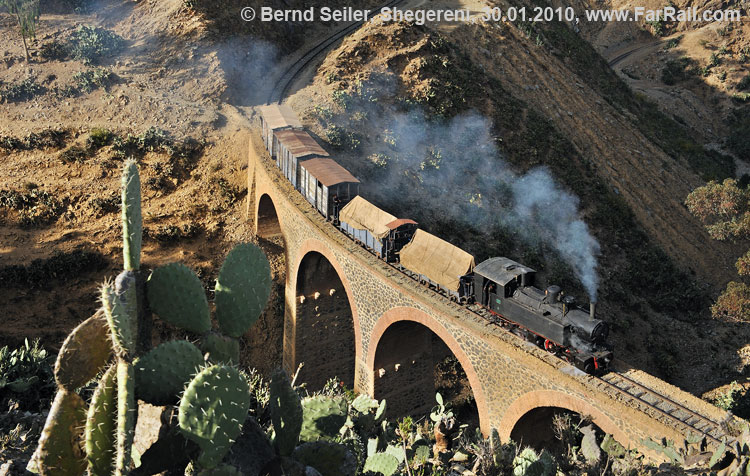
The prices are land only prices. We can book the flight for you and would charge you the flight ticket separately.
| Eritrea | ||
| Containers to Asmara - The First real Freight for more than 30 Years! | 10 to 10 participants | £870 |
| 29.11.2010 – 06.12.2010 | Single room surcharge | £150 |
| Registration Deadline: 03.09.2010 Special Event: Donation to the railways | ||
If you want to stay in the hotel with a better standard (single rooms only) the additional cost is £225. Have a look in a room here:
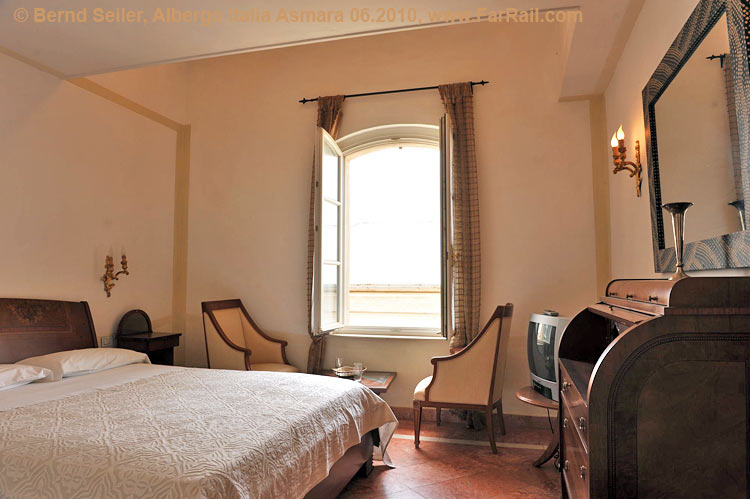
The price includes:
Not included:
DISCLAIMER
As a service to our UK-based clients FarRail Tours accepts and will continue to accept payments made out in Pounds Sterling until further notice. However, please note that all prices quoted in Pounds Sterling are indicative only and are subject to change without prior notice. This measure was taken by FarRail Tours because of the unprecedented volatility in the international foreign exchange markets and its impact on the valuation of the Pound Sterling versus other major currencies, namely the Euro as FarRail Tours' accounting currency.Further pictures you'll find in the Eritrea galleries section.
